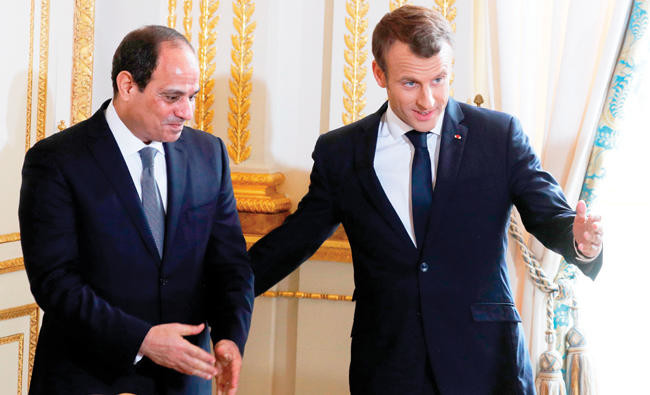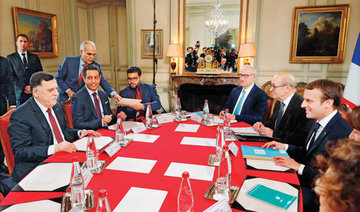PARIS: French President Emmanuel Macron lauded deepening security and diplomatic ties with Egyptian leader Abdel Fattah El-Sisi on Tuesday.
Macron stressed how Egypt was a vital partner in the fight against extremism in the Middle East and Europe, as well as key in the search for lasting political solutions in war-wracked Libya and Syria.
“The first battle that we have in common is the fight against terrorism,” Macron said during a joint press conference, which underlined their common purpose against extremists, which have claimed hundreds of victims in both countries.
Cairo is fighting the Egyptian branch of Daesh in the north of the Sinai Peninsula and has faced a series of attacks that has affected its vital tourism industry.
At least 16 Egyptian police officers were killed at the weekend in an ambush by Islamist fighters in the country’s western desert in a rare flare-up outside the Sinai.
Egypt is a major buyer of French military equipment with orders worth more than €5 billion ($5.8 billion) since 2015.
Those deals were negotiated by former Defense Minister Jean-Yves Le Drian who is now foreign minister in Macron’s government.
Earlier on Tuesday, Finance Minister Bruno Le Maire told Europe 1 radio France would discuss the possible sale of more Rafale aircrafts with El-Sisi during his visit.
Under the previous government, France had concluded several major military agreements with Egypt, including the sale of 24 Rafale combat aircraft, a multi-mission frigate and two Mistral warships in contracts worth some €6 billion.
The 2015 Rafale contract — the first export contract for the jet — included the option of selling another 12 aircrafts.
“If there can be new contracts, so much the better…” said Le Maire, when asked by Europe 1 radio to comment on reports that the sale of the extra 12 aircrafts was on the table but that his ministry was reluctant because of the payment terms asked for by Egypt.
“It is normal that Bercy (the French finance ministry) would want to make sure Egypt should be able to pay its plane orders,” Le Maire said.
Macron lauds deepening security ties with Egypt
Macron lauds deepening security ties with Egypt

Chechnya leader’s son, 17, becomes head of Chechen security council

- It is the fourth time Adam Kadyrov has been appointed to an official position since 2023, when he was 15
- He already serves as his father’s top bodyguard
The teenage son of Ramzan Kadyrov, the leader of Russia’s Chechnya region and close ally of President Vladimir Putin, has been appointed secretary of the region’s security council, according to the council’s Telegram channel.
Adam Kadyrov turned 17 in November 2024. It is the fourth time he has been appointed to an official position since 2023, when he was 15.
He already serves as his father’s top bodyguard, a trustee of Chechnya’s Special Forces University, and an observer in a new army battalion.
Ramzan Kadyrov has led Chechnya, a mountainous Muslim region in southern Russia that tried to break away from Moscow in wars that followed the collapse of the Soviet Union, since 2007.
He enjoys wide leeway from Putin to run Chechnya as his personal fiefdom in return for ensuring the stability of the region, where an Islamist, anti-Russian insurgency continued for around a decade after the end of full-scale conflict there in the early 2000s.
His rise to power came after his own father, Akhmat, was killed in a 2004 bombing by insurgents who saw him as a turncoat.
In September 2023, Adam Kadyrov was shown, in a video posted by his father on social media, beating a detainee accused of burning the Qur'an. Ramzan Kadyrov said he was proud of his son for defending his Muslim religion.
The detainee, Nikita Zhuravel, has since been sentenced to three and a half years in prison.
Russian drone strike on bus kills 9 in Ukrainian city of Marhanets, Kyiv says

“An ordinary bus. Clearly a civilian object, a civilian target,” Zelensky said
KYIV: A Russian drone hit a bus carrying workers in the Ukrainian city of Marhanets on Wednesday, killing nine people and injuring close to 50, Kyiv officials said, in an attack President Volodymyr Zelensky said was a “deliberate war crime.”
Zelensky said the Russian strike hit a bus that was transporting workers of a mining and processing plant.
“An ordinary bus. Clearly a civilian object, a civilian target,” Zelensky said on X.
“It was an egregiously brutal attack – and an absolutely deliberate war crime,” he added, calling for “an immediate, full, and unconditional ceasefire.”
Russia fired a total of 134 attack drones at targets in Ukraine overnight, Kyiv’s air force said. There was no immediate comment from Russia.
Ukrainian officials arrived in London on Wednesday, even as most other big power foreign ministers pulled out, to hold talks about ways to achieve a ceasefire as a first step toward peace.
Marhanets, in south-central Ukraine, lies on the Ukrainian-controlled north bank of the Dnipro river’s dried-up reservoir that separates the warring sides.
Dnipropetrovsk regional governor Serhiy Lysak said nine people were killed in the attack and 49 were injured.
Zelensky shared photographs of the aftermath of the attack on X, showing bodies lying in and next to the bus and being carried away by emergency workers.
Zelensky added most of the injured were women.
Elsewhere, an energy plant that provides electricity to the city of Kherson near southern front lines was destroyed in an artillery and drone attack, regional governor Oleksandr Prokudin said.
Ukraine’s emergency service also reported a drone strike on the Synelnykivskyi district in the Dnipropetrovsk region that injured two people and sparked a fire at an agricultural enterprise.
Russia further fired drones into the central region of Poltava, injuring at least six people, its governor said.
A drone attack on civilian infrastructure in the suburbs of the Black Sea port city of Odesa injured two people and sparked several fires, regional governor Oleh Kiper said on Telegram.
Russian drone salvoes also set off large-scale fires in Ukraine’s second largest city, Kharkiv, in the northeast, Mayor Ihor Terekhov said on Telegram.
Seven private houses, a storage building and an outbuilding were also damaged by drones hitting the Kyiv capital region, where a fire also broke out in a restaurant complex, its regional governor said.
Both Russia and Ukraine are under pressure from the United States to demonstrate progress toward ending the war that began with Russia’s 2022 full-blown invasion amid warnings that US President Donald Trump could walk away from peacemaking.
Following Kashmir attack, Modi cuts short Saudi trip after talks on energy, defense

- Saudi Arabia is one of the top exporters of petroleum to India
- Modi met Crown Prince Mohammed bin Salman before cutting short his visit
DUBAI: Saudi Arabia and India agreed to boost cooperation in supplies of crude and liquefied petroleum gas, according to a joint statement reported by the Saudi state news agency on Wednesday following a visit by Prime Minister Narendra Modi, which was cut short by a militant attack in Indian-administered Kashmir.
Saudi Arabia is one of the top exporters of petroleum to India.
Modi met Crown Prince Mohammed bin Salman before cutting short his visit and returning to New Delhi after an attack on India’s Jammu and Kashmir territory which killed 26 people, the worst attack in India since the 2008 Mumbai shootings.
The two countries also agreed to deepen their defense ties and improve their cooperation in defense manufacturing, along with agreements in agriculture and food security.
“The two countries welcomed the excellent cooperation between the two sides in counter-terrorism and terror financing,” the joint statement said.
Staunchly Catholic Philippines begins period of mourning for Pope Francis

- “Pope Francis holds a special place in the hearts of the Filipino people,” Marcos said
- Francis drew a record crowd of up to seven million people at a historic Mass in Manila during a visit in 2015
MANILA: The Philippines began a period of national mourning for Pope Francis on Wednesday, with President Ferdinand Marcos Jr ordering flags on all state buildings across the staunchly Roman Catholic country to fly at half-mast to honor the pontiff.
Francis died on Monday aged 88 after suffering a stroke and cardiac arrest, the Vatican said, ending an often turbulent reign in which he repeatedly clashed with traditionalists and championed the poor and marginalized.
“Pope Francis holds a special place in the hearts of the Filipino people,” Marcos said in a presidential proclamation, adding that the period of mourning would continue until Francis’ funeral at the Vatican on Saturday.
“The passing of Pope Francis is a moment of profound sorrow for the Catholic Church and for the Filipino people, who recognize him as global leader of compassion and tireless advocate of peace, justice and human dignity,” the proclamation said.
The Philippines is home to more than 80 million Catholics, or nearly 80 percent of the population, making it one of only two majority Christian nations in Asia along with tiny East Timor.
Francis drew a record crowd of up to seven million people at a historic Mass in Manila during a visit in 2015.
Since his death on Monday, the Catholic Church has held Masses across the Philippines for Francis.
At the Baclaran Church in Manila, some worshippers on Wednesday wore shirts bearing Pope Francis’ image — leftover merchandise from his 2015 visit.
Emma Avancena, 76, who was a volunteer during the pope’s visit, said she felt sad about his death but added: “I feel blessed because we were blessed face to face, eye to eye (during the visit).”
First Indonesian Hajj pilgrims to reach Saudi Arabia next week

- Kingdom’s Makkah Route initiative will facilitate pilgrims in Jakarta, Surabaya and Solo
- Thousands of Indonesian Hajj officers will be stationed in Makkah, Madinah and Jeddah
JAKARTA: The first group of more than 1,500 Indonesian pilgrims will depart for Saudi Arabia under the Makkah Route initiative next week, as 221,000 are expected to take part in this year’s Hajj.
In 2025, the Hajj is expected to take place on June 4 and end on June 9.
Though the pilgrimage itself can be performed over five or six days, many pilgrims arrive early to make the most of the once-in-a-lifetime opportunity to fulfill their religious duty.
“Indonesian pilgrims will start departing on May 2, and this will be our first batch,” Hilman Latief, director general of Hajj and Umrah management at the Ministry of Religious Affairs, told Arab News.
“Some of them are still in the visa processing stage, but we are optimistic that their visas will be issued before their departure … we hope that the Hajj journey this year can go smoothly, and that our pilgrims will have a comfortable and safe trip.”
Indonesia, the world’s biggest Muslim-majority nation, sends the largest Hajj contingent of pilgrims every year to perform the spiritual journey that is one of the five pillars of Islam.
Its first Hajj flights are scheduled to depart from the cities of Jakarta, Surabaya and Solo, where Indonesian pilgrims will be facilitated under Saudi Arabia’s Makkah Route initiative.
Launched in Muslim-majority countries in 2019, the program allows Hajj pilgrims to fulfill all visa, customs and health requirements in one place, at the airport of origin, and save long hours of waiting before and upon reaching the Kingdom.
When they arrive in Saudi Arabia, Indonesians will be assisted by more than 4,000 Hajj officers who are stationed in Jeddah, Madinah and Makkah.
Each batch will have four officers, including medics, helping them at all times, said Nasrullah Jasam, who heads the Indonesian Hajj Organization Committee in Saudi Arabia.
“On the ground, the officers are also divided into various sectors. They are tasked to serve the pilgrims with things related to accommodation, transportation and food,” Jasam told Arab News.
“Our Hajj officers have undergone the technical guidance in Jakarta and are now preparing for the same in Saudi Arabia … we are ready.”

















